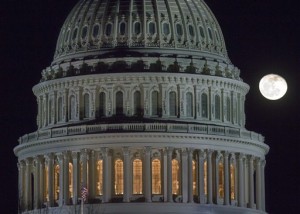Fiscal cliff fiasco exposes dysfunction of US Congress

The moon rises behind the US Capitol Dome in Washington as Congress works into the late evening, Sunday, Dec. 30, 2012, to resolve the stalemate over the pending “fiscal cliff.” Lawmakers are on the brink of letting their nation slide over the fiscal cliff—leaving senators to fume that nobody does dysfunction better than the US Congress. AP PHOTO/J. DAVID AKE
WASHINGTON—Lawmakers on Capitol Hill are on the brink of letting their nation slide over the so-called fiscal cliff—leaving senators to fume that nobody does dysfunction better than the US Congress.
Americans would likely agree; the country’s elected representatives have long been derided as hapless slackers, but this year with a fiscal crisis now staring at Americans like a deer in the headlights—it’s different.
The 112th Congress is being seen as the least effective in decades.
On Sunday, during a rare holiday-week Senate session, they cemented that reputation, when the mood among many lawmakers inside the US Capitol reflected the wintry conditions outside: cold, dark, and somewhat unforgiving.
ith 36 hours before the US economy was to suffer a half trillion dollars in tax hikes and spending cuts in 2013, Senators shuttled between the chamber and their caucus lunches, unable to agree on a path forward to avoid a crisis that has been nearly two years in the making.
Article continues after this advertisementLittle knowledge of horsetrading
Article continues after this advertisementMany of them said they had little knowledge of the horsetrading that was going on behind closed doors.
“I haven’t heard there’s a deal,” Senator Barbara Boxer accurately pointed out to AFP.
“It’s a little bit like choosing the new Pope,” she said. “The smoke comes out and it’s white and you know. But I haven’t seen any evidence of that.”
Neither had anyone else, and with the fiscal cliff barely a day away, lawmakers were looking squeamish.
Senator Barbara Mikulski, the longest-serving woman in the history of Congress, sounded nearly apoplectic, describing the gridlock as “one of the lowest points” in her 35 years as a lawmaker.
“I have lived through 9/11, when we were attacked by outside forces. I’ve lived through the impeachment of a president, which was so enormously difficult. But this is what we’re doing to ourselves,” she winced.
Blame game
President Barack Obama and Republican House Speaker John Boehner hardly set the worthy example Sunday, pointing the finger of blame at each other as they explained away the lack of a deal.
Lawmakers mulled over an alphabet soup of negotiating points such as the AMT, Medicare SGR, UI, and change to the apportioning of Social Security benefits known as “chained CPI.” Many offered conflicting details of what might or might not be in the parties’ deal offers.
“Is this sloppy, is it frustrating, is it enough to make you want to tear your hair out if you’re watching from afar? Yeah,” posed Claire McCaskill, a Democrat from Missouri.
“But on the other hand, we do it better than anybody in the world,” she added.
“We don’t have armed coups. We just go to the ballot box, and sometimes the results are not the kind of thing that everybody holds hands and sings Kumbaya. This is definitely not a Kumbaya moment.”
Despair
Republican Richard Lugar, a soft-spoken, 36-year veteran of the Senate who departs January 3 after losing a party primary challenge to a hardline conservative, spoke of the despair that comes with legislative problems “that seem to be veering out of control.”
“Really in both parties, the polarization has increased, become more intense, and is represented in what we’re seeing this afternoon,” the soft-spoken Lugar said.
Studies show polarization has gripped the electoral map. Nate Silver of The New York Times wrote recently about the gradual erosion of House districts that swing between political parties.
While there were some 103 swing districts in 1992, just 35 exist today, Silver found, while the number of districts where parties win by landslides has soared. Such changes have made compromise harder.
Senate Democrat Dick Durbin acknowledged that while “it looks awful,” US lawmakers routinely wait until their backs are against the wall before accomplishing major legislation.
“It’s human nature,” he explained.
“That’s the reason why we put off our trips to the dentist,” Durbin said.
“When it’s something painful, we put it off to the last minute, and this is a pretty painful exercise.”